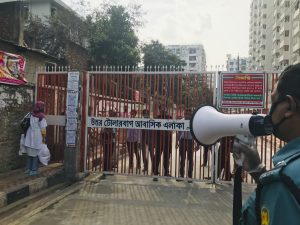Bangladesh Prime Minister Sheikh Hasina appealed on Wednesday to all citizens to stay at home and avoid any gatherings to slow the transmission of the coronavirus.
In particular, she urged hundreds of thousands of Bangladeshis who worked abroad and recently returned to the country from virus-hit countries to isolate themselves at home for 14 days.
“It is essential to follow the directives to save the lives of your family members, neighbors, and ultimately all of your countrymen,” she said in a televised address. “Do not leave home unless it’s an emergency.”
Experts say there is a high risk that people who returned in recent weeks and attended social gatherings will spread the virus.
Bangladesh is a densely populated delta nation. About 10 million of its citizens work abroad.
Hasina also announced a number of programs to provide free food and cash to the country’s poorest people.
“Many people have become unemployed because of the coronavirus epidemic. We need to stand beside them. Members of the lower income groups will receive assistance in their own villages … homeless and landless people will get free housing, food for six months and cash incentives,” Hasina said.
She also declared a stimulus package for the country’s export-oriented manufacturers, including the large garment industry, to help pay millions of workers.
Bangladesh’s garment industry is the world’s second largest after China’s. It annually earns about $30 billion from exports of garment products, mainly to the United States and Europe.
The sector has employed about 4 million workers, mainly women from rural Bangladesh. Industry officials say many big orders have already been canceled by Western buyers because of the impact of the virus globally.
The country will go on a 10-day general holiday during which it will suspend all passenger trains, buses and flights until April 4 to slow the spread of the virus.
However, Hasina’s advice to stay at home was already being ignored the same day it was given. A large gathering formed Wednesday to celebrate the release of imprisoned opposition leader and former Prime Minister Khaleda Zia. She was released for six months on condition that she stays at home and does not attempt to leave the country.
Zia was convicted in February 2018 on charges of misusing her power by embezzling some $250,000 in donations meant for an orphanage trust. She was later convicted in another corruption case, with her combined sentence totaling 17 years in prison She had spent more than two years in the prison cell of the Bangabandhu Sheikh Mujib Medical University in the capital, Dhaka.
Her Bangladesh Nationalist Party says the cases were politically motivated. The government of Hasina, Zia’s archrival, denies the allegation.
On Tuesday, Law Minister Anisul Huq said Zia, 74, was being released on humanitarian grounds considering her age. She will receive her remaining treatment at home, he said. Zia’s party says she is seriously ill with ailments including respiratory problems and arthritis.
Her family and senior party leaders received her on Wednesday as hundreds of supporters ignored calls to avoid gathering to stop the spread of coronavirus.
Bangladesh has reported 39 confirmed cases of the virus and five deaths.
By Julhas Alam for The Associated Press.

































